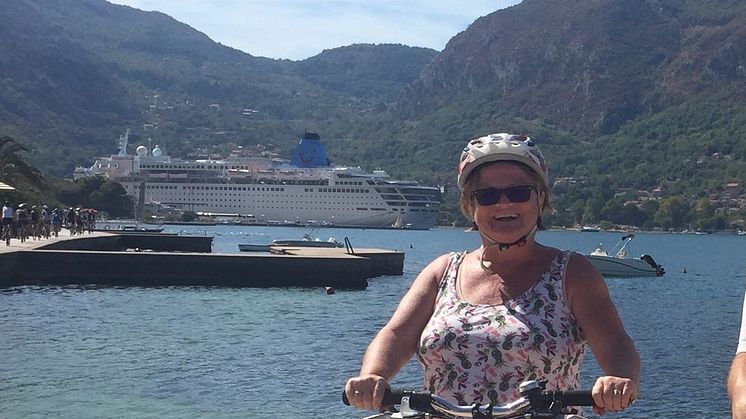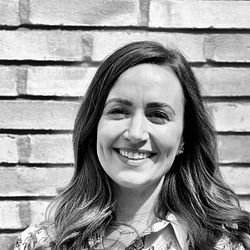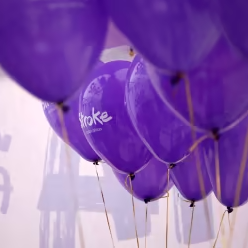
Press release -
Trapped and Terrified: Over 1 million stroke survivors’ recoveries under threat
More than one million(i) stroke survivors (89%) live in fear of having another stroke and are scared to go out alone (79%), leaving them afraid for their recovery (79%) in the aftermath of their stroke, according to a leading national charity. The Stroke Association’s startling new findings(ii) show how people’s recoveries are under threat from fear itself.
The charity’s latest research (of over 1,000 stroke survivors) also reveals the hidden barriers that people can face after stroke, often too scared to talk to anyone about:
- One in five (20%) stroke survivors said they kept their fears to themselves and didn’t talk to anyone
- Over a third (37%) of these stroke survivors said they didn’t want to worry anyone, they were too afraid (27%) or didn’t want to sound stupid (26%) by talking about their fears.
On top of dealing with these fears and concerns, the study also shows that many stroke survivors are facing their recovery alone. This leads to a bleak attitude to recovery with almost nine in ten (88%) survivors afraid they won’t get better and four out of five (80%) fearing they would get sent to a care home when they first had their stroke. Fear prevents people from getting out and about and meeting others, two of the key factors that stroke survivors have said are integral to their recovery.
For Karen Craven, 62, from Nottingham, it was the fear of having another stroke that would lead to her being diagnosed with Post Traumatic Stress Disorder and chronic anxiety.
Karen had her stroke in September 2015, when she noticed a severe pain over her right temple. Her son, who was luckily at home at the time, noticed Karen had slurred speech and couldn’t use the left side of her body.
On arriving at hospital, Karen was one of the first patients to try the new and cutting edge Thrombectomy treatment. Fortunately she made a miraculous physical recovery and spent just four days in hospital, where she became known as a ‘walking miracle’ However, Karen would go on to struggle with fear and uncertainty after such a traumatic event.
Karen said: “Even after time passes, you are always acutely aware of how vulnerable you are after a stroke. At first I didn’t dare go to sleep because I thought I would have another stroke and not wake up”
“I couldn’t sleep at night. My thoughts and anxiety about what I’d been through were out of control, I was on sleeping tablets which had their own problems too. I wanted it all to go away, I just didn’t see a way through it”
It was only after visiting a counsellor, who diagnosed her with PTSD and throwing herself into exercise that Karen felt she could start moving forward with her life again. She now uses exercise as a method for calming the anxiety and regularly swims, joins friends for hill walks and has even completed a 150 mile, coast to coast bike ride challenge.
Karen said: “I remember I really didn’t like where my thoughts were going, so I asked myself, ‘what can I do about it?’ I knew I had to learn to deal with it - exercise and getting into nature has really helped the anxiety”
“Some days I still wake up full of anxiety but then I go for a big walk around the local area and I feel so much better when I get back. My mantra is always, ‘onwards and upwards and I need to keep going.’
Juliet Bouverie, Chief Executive of the Stroke Association, said: “These stats are truly shocking. I am heart-broken to hear that stroke survivors felt they couldn’t speak to those closest to them about their biggest worries and fears. When you live in isolation, too afraid to leave the house and are unable to ask for help, your motivation can disappear, and can leave you in a very bad place emotionally – feeling like a prisoner in your own home.
“It takes a team to rebuild lives after stroke. When stroke strikes, part of your brain shuts down, and so does a part of you. Recovery is tough, but with the right specialist support, the brain can adapt after stroke. I’ve heard countless stories, and know countless people who, after many years continue to make remarkable recoveries. The first step to eliminating fear is to ask for help and support. If you are a stroke survivor, this could mean speaking to your doctor or social worker to get some answers. If you know a stroke survivor, reach out, ask them how they’re feeling. No one should have to live their life in constant fear.”
The Stroke Association’s research also found that:
- Only 18% of stroke survivors were confident that they would get enough support to make a good recovery
- 87% of stroke survivors said they feared losing their independence
- 81% of stroke survivors said they were afraid they wouldn’t be able to look after their children or parents.
Juliet continues: “I was horrified to find out that there are still many people who feel helpless. People are missing out on the life they could have – this must change. Don’t be afraid to ask questions about your health. We want everyone to know that you can rebuild your life after stroke. Every stroke is different and so is every recovery. It can take years to adjust to a new normal.
“The Stroke Association’s Helpline is for everyone affected by stroke. There are no stupid questions. If you are worried about anything, call 0303 3033 100 and get support from one of our trained helpline staff.”
For more information about Rebuilding Lives or about stroke, visit www.stroke.org.uk/rebuildinglives.
-Ends-
For more information on the research, please contact: Ken Scott, 0115 7788429 or ken.scott@stroke.og.uk
Notes to Editors
About the research
- (i)1.2 million stroke survivors in the UK according to the Stroke Association’s State of the Nation report https://bit.ly/2ntPyX5
- (ii)Statistics based on a 4Media Relations survey of 1,001 stroke survivors conducted August 2019.
Rebuilding Lives
- The Stroke Association’s Rebuilding Lives campaign will change the way people think about stroke using stroke survivors’ real stories. Told in their own words. Unscripted. Unfiltered.
- These stories show that stroke can strike anyone at any time. Changing lives in an instant. They’ll help people understand that a stroke happens in the brain – the control centre for who you are and what you can do. And that the impact varies depending on which part of the brain is affected. It could be anything from wiping out your speech and physical abilities, to affecting your emotions and personality. Crucially, the stroke survivors in our campaign are living proof that life after stroke is possible. With the right specialist support and a ton of courage and determination, the brain can adapt. People can recover. Adjust to a new normal. There is hope.
- The Stroke Association is here to support people to rebuild their lives after stroke. Our campaign will inspire everyone to take action and join our growing community. Because everyone deserves to live the best life they can after stroke.
Topics
- Stroke strikes every five minutes in the UK and it changes lives in an instant.
- The Stroke Association is a charity working across the UK to support people to rebuild their lives after stroke. We believe that everyone deserves to live the best life they can after stroke. From local support services and groups, to online information and support, anyone affected by stroke can visit stroke.org.uk or call our dedicated Stroke Helpline on 0303 3033 100 to find out about support available locally.
- Our specialist support, research and campaigning are only possible with the courage and determination of the stroke community and the generosity of our supporters. With more donations and support, we can help rebuild even more lives.
- You can follow us on Twitter, Facebook and Instagram.











